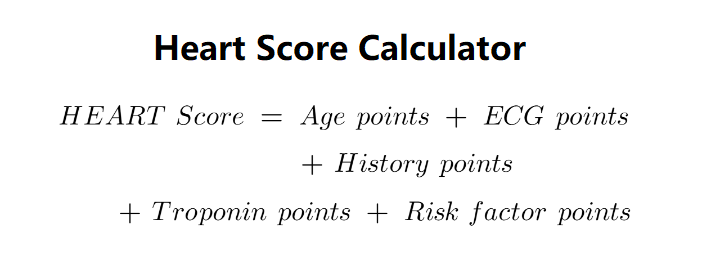1. What is the HEART Score Calculator?
Definition: The HEART Score Calculator assesses the risk of Major Adverse Cardiac Events (MACE) within 6 weeks for patients presenting with chest pain.
Purpose: It helps clinicians stratify patients into low, medium, or high risk categories to guide decisions on discharge, observation, or urgent intervention.
2. How Does the Calculator Work?
The calculator sums points from five risk factors to compute the HEART Score:
HEART Score = Age points + ECG points + History points + Troponin points + Risk factor points
The interpretation is based on the total score, with the following ranges:
- 0–3: Low risk (1.7% MACE risk). (Consider discharge with outpatient follow-up.)
- 4–6: Medium risk (12–17% MACE risk). (Admit for observation and further evaluation.)
- 7–10: High risk (50–65% MACE risk). (Admit to hospital, consider urgent cardiology consultation.)
Inputs:
- Age (years)
- 12-Lead ECG (Normal, Abnormal without ST deviation, Abnormal with ST deviation)
- History (Nonspecific, Mixed, Specific for ACS)
- Initial Troponin (Normal, Elevated 1–3 times, Elevated >3 times)
- Risk Factors (None, 1–2, 3 or more)
Steps:
- Input the patient’s age, ECG findings, history, initial troponin level, and number of risk factors.
- Assign points to each parameter based on predefined criteria.
- Sum the points to calculate the HEART Score.
- Interpret the risk level and provide a recommended action.
3. Importance of HEART Score Calculations
The HEART Score calculation is useful for:
- Risk Stratification: Identifies patients at low, medium, or high risk of MACE.
- Guiding Treatment: Helps decide whether a patient can be discharged, needs observation, or requires urgent care.
- Resource Allocation: Optimizes hospital resources by identifying low-risk patients who can avoid unnecessary admission.
4. Using the Calculator
Examples:
- Age: 40 years, ECG: Normal, History: Nonspecific, Troponin: Normal, Risk Factors: None:
Age points: 0, ECG points: 0, History points: 0, Troponin points: 0, Risk Factor points: 0.
HEART Score: \( 0 + 0 + 0 + 0 + 0 = 0 \).
Risk Level: Low risk, MACE Risk: 1.7%.
Recommended Action: Consider discharge with outpatient follow-up.
- Age: 70 years, ECG: Abnormal with ST deviation, History: Specific for ACS, Troponin: Elevated >3 times, Risk Factors: 3 or more:
Age points: 2, ECG points: 2, History points: 2, Troponin points: 2, Risk Factor points: 2.
HEART Score: \( 2 + 2 + 2 + 2 + 2 = 10 \).
Risk Level: High risk, MACE Risk: 50–65%.
Recommended Action: Admit to hospital, consider urgent cardiology consultation.
5. Frequently Asked Questions (FAQ)
Q: What is the HEART Score?
A: The HEART Score is a clinical tool to predict the risk of Major Adverse Cardiac Events (MACE) in patients with chest pain.
Q: What does a low HEART Score mean?
A: A score of 0–3 indicates a low risk (1.7%) of MACE, suggesting the patient may be safely discharged with follow-up.
Q: Why is troponin important in the HEART Score?
A: Elevated troponin levels indicate myocardial injury, significantly increasing the risk of MACE.
 Home
Home
 Back
Back
